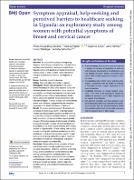| dc.contributor.author | Mwaka, Amos Deogratius | |
| dc.contributor.author | Walter, M. Fiona | |
| dc.contributor.author | Scott, Suzanne | |
| dc.contributor.author | Harries, Jane | |
| dc.contributor.author | Wabinga, Henry | |
| dc.contributor.author | Moodley, Jennifer | |
| dc.date.accessioned | 2021-04-29T11:56:18Z | |
| dc.date.available | 2021-04-29T11:56:18Z | |
| dc.date.issued | 2021-01-19 | |
| dc.identifier.citation | Mwaka, A.D., Walter, F.M., Scott, S., Harries, J., Wabinga, H. and Moodley, J., 2021. Symptom appraisal, help-seeking and perceived barriers to healthcare seeking in Uganda: an exploratory study among women with potential symptoms of breast and cervical cancer. BMJ open, 11(2), p.e041365. | en_US |
| dc.identifier.issn | 2044-6055 | |
| dc.identifier.uri | http://hdl.handle.net/20.500.12280/2793 | |
| dc.description.abstract | Objective We assessed the process of recognising abnormal bodily changes, interpretations and attributions, and help-seeking behaviour among community-based Ugandan women with possible symptoms of breast and cervical cancer, in order to inform health interventions aiming to promote timely detection and diagnosis of cancer. Design Qualitative in-depth interviews.
Setting Rural and urban communities in Uganda. Participants Women who participated in the African Women Awareness of cancer cross-sectional survey who disclosed potential breast and cervical cancer symptoms were eligible; recruitment was purposive. Interviews were conducted in women’s homes, lasted between 40 and 90min, were audio-recorded, transcribed verbatim and translated to English. Thematic analysis was used to identify themes and subthemes, underpinned by the conceptual framework of the Model of Pathways to Treatment.
Results 23 women were interviewed: 10 had potential symptoms of breast cancer and 13 of cervical cancer. Themes regarding symptom appraisal and help-seeking included the: (1) detection and interpretation of abnormal bodily sensations; (2) lay consultations regarding bodily changes; (3) iterative process of inferring and attributing illnesses to the bodily changes; (4) restricted disclosure of symptoms to lay people due to concerns about privacy and fear of stigmatisation; (5) help-seeking from multiple sources including both traditional and biomedical health practitioners, and (6) multiple perceived barriers to help-seeking including long waiting times, lack of medicines, absenteeism of healthcare professionals, and lack of money for transport and medical bills.
Conclusion Women with potential symptoms of breast and cervical cancer undergo complex processes of symptom interpretation, attributing symptoms or inferring illness, and lay consultations before undertaking help-seeking and management. Increasing community understanding of breast and cervical cancer symptoms, and tackling perceived barriers to health-seeking, could
lead to prompt and appropriate symptom appraisal and help-seeking, and contribute to improving cancer outcomes. | en_US |
| dc.language.iso | en | en_US |
| dc.publisher | BMJ Publishing Group Ltd | en_US |
| dc.relation.ispartofseries | BMJ open;11(2) | |
| dc.subject | Symptom appraisal | en_US |
| dc.subject | Help-seeking | en_US |
| dc.subject | Perceived barriers | en_US |
| dc.subject | Healthcare seeking | en_US |
| dc.subject | Uganda | en_US |
| dc.subject | Cervical cancer | en_US |
| dc.subject | Breast cancer | en_US |
| dc.title | Symptom Appraisal, Help-seeking and Perceived Barriers to Healthcare Seeking in Uganda: An Exploratory Study Among Women With Potential Symptoms of Breast and Cervical Cancer | en_US |
| dc.type | Article | en_US |


